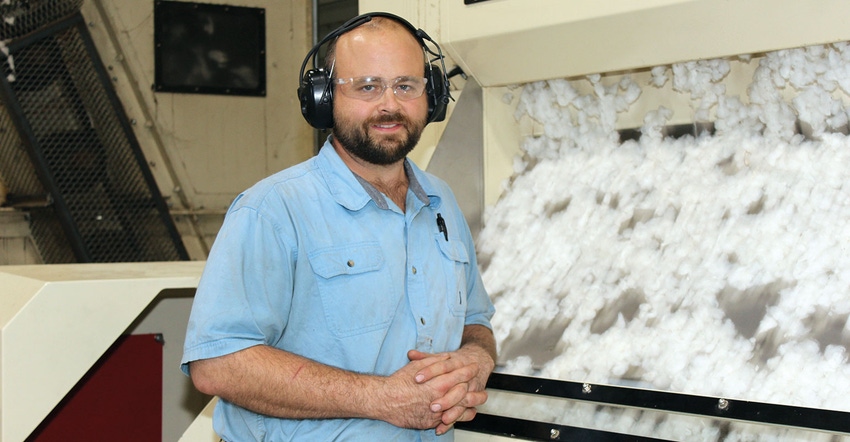
As more traditional cotton pickers and strippers across the Cotton Belt continue to be replaced with John Deere’s on-board module harvesters, an increasing number of gins have begun looking for and hiring employees who can help assimilate the technologies these machines bring to their ginning operations.
Tim Price, executive director, Southern Cotton Ginners Association, recognizes the need for stronger educational programs in this area as advances in technology literally change the way gins operate and provide service to their grower clients.
“These new machines and many other emerging ginning technologies bring so much to our industry, but the ginning industry needs early-stage and on-going educational programs designed to prepare current and future ginners for these advancements,” says Price.
Jimmy Lyons, controller for Caruthersville Gin in Caruthersville, Mo., has 10 years of experience in the banking industry. He was hired on a part-time basis four years ago, but in June 2018, he was offered and accepted a full-time position.
“I was familiar with ginners and farmers because I worked with them to secure ag loans for their operations,” says Lyons. “I have a strong background in accounting and finance, but I’m also pretty tech-savvy.”
Caruthersville Gin has two on-board module harvesters they use to custom harvest for their grower clients, and Lyons is working to prepare the gin for the technologies those harvesters offer.
“I currently spend about 40 percent of my time on accounting responsibilities and 60 percent on IT needs,” says Lyons. “We’re quickly ramping up our ability to increase our efficiencies through these RFID-based technologies.”
From managing their bale inventory and being able to recognize the location of each module after the harvester drops it in the field, to the time it arrives at the module feeder, Lyons knows there is a great deal of technology these machines can bring to Caruthersville Gin. “I believe they hired me because of the skillset I bring to the overall operation,” says Lyons.
Software and hardware
Bogue Chitto Gin, in Macon, Miss., has been working with computer software solutions company EWR, Inc., to better define exactly what they need to take the next step in RFID utilization.
One important thing all gins need to remember is Microsoft will soon stop supporting Windows 7. An upgrade to Windows 10 will be necessary.
“We have assimilated some things into our operation, but I think we could do so much more, and that’s why we’re working with Joe Wyrick, CEO, EWR, Inc., and his staff to help us move in that direction,” says Aaron Litwiller, gin manager, at Bogue Chitto Gin.
“These newer harvesters now have the ability to record moisture levels of the cotton being harvested. Having that information before those modules reach the gin will allow our ginner to make adjustments to the ginning system to hopefully improve our cotton’s end quality.”
Jonathon McBride, Bogue Chitto’s ginner, worked previously for Silver Creek Gin in Holly Bluff, Miss. While there, he established several aspects of the RFID-related technologies for that gin.
“We hired Jonathon mainly for his ginning qualifications, but his experience with this new module-handling technology will help us get where we want to be with this growing technology,” says Litwiller.
Joe Wyrick, EWR, Inc., has seen so many gins that do not have the correct computer hardware to run software programs written to drive the various RFID technology options.
“Finding employees in rural areas qualified to take on these responsibilities is often difficult,” says Wyrick. “Many gins will hire someone on a part-time basis or hire a consultant — usually at the start or at the end of the ginning season.”
Dr. Ed Barnes, senior director, Agricultural and Environmental Research, Cotton Incorporated, has seen this human resources need developing and being solved at gins across the Cotton Belt.
“At Coastal Carolina Gin, Todd Waters is pushing the envelope on closing the informational loop back to his grower clients,” says Barnes. “At EdCot Gin in south Texas, Daniel Luehrs and Rene Garcia are pushing the limits of RFID technology in that operation.”
Barnes was a guest lecturer at this year’s Ginners School held at the USDA-ARS Ginning Research Unit in Stoneville, Miss. “Dr. Barnes gave an overview of the options RFID technology offered by the new harvesters, and how they can improve a gin’s ability to manage round modules,” says Dr. Ruixiu Sui, acting research leader at the USDA-ARS facility.
“As the percentage of round modules being handled at gins across the country increases, I anticipate all the regional gin schools will include more information about this game-changing technology.”
About the Author(s)
You May Also Like




